Learning how to get enough protein as a vegan is arguably the biggest challenge for a new vegan athlete.
Even though I’ve gained about 20 pounds of (mostly) muscle on a vegan diet, it’s still a challenge and takes a lot of planning.
I’d like to make it easier for you with this guide. By the end, you’ll learn:
- The best vegan sources of protein to focus on
- How plant protein compares to animal protein quality
- Whether or not you need protein powder
- If soy is as dangerous as some people say
Table of Contents
How Much Protein Do Vegans Need Per Day?
Examine.com did a thorough review on how much protein people need, containing over 100 references to peer-reviewed papers (1).
They found that sedentary people need at least 1.2g/kg (or 0.55g/lb), while experienced lifters need at most 3.3g/kg (1.5g/lb) – but that’s on the very high end.
For example, a sedentary 150 lb person would need at least 82.5 grams of protein per day, which isn’t all that much.
In reality, even a vegan trying to gain weight doesn’t need that much.
In a highly referenced metastudy (2), they found the optimal amount of protein for athletes is closer to 1.8g/kg (0.82g/lb). Anything past that does not help maintain or gain muscle:
There is normally no advantage to consuming more than 0.82g/lb (1.8g/kg) of protein per day to preserve or build muscle for natural trainees. This already includes a mark-up, since most research finds no more benefits after 0.64g/lb.
Vegan protein requirements aren’t significantly different from an omnivore’s.
While the optimal amount of protein depends on the person, athletes don’t need much more than 0.82 grams of protein per lb of body weight, and sedentary vegans only need 0.55 g/lb. More won’t hurt, but it won’t help.
Can Vegans Get Enough Protein to Build Muscle?
One common myth about protein on a vegan diet is that vegans can’t get enough protein to build muscle.
But recent research has shown that when it comes to athletics, vegan diets stack up well to omnivores (3):
Both groups were comparable for physical activity levels, body mass index, percent body fat, lean body mass, and muscle strength. However, vegans had a significantly higher estimated VO2 max and submaximal endurance time to exhaustion compared with omnivores.
I’m telling you right now from experience that it will take more meal planning as a vegan, but you can be just as good of an athlete as you were before going vegan. There may even be health benefits. You might find this comparison of vegan protein sources vs meat helpful.
I played multiple seasons of semi-professional soccer after going vegan, and it helped me if anything (honestly I didn’t notice much of a performance difference).
The Digestibility of Plant Based Proteins
There are 2 aspects of protein quality.
First are the nine essential amino acid profile of a protein source.
It’s not a big deal as long as you’re eating a variety of foods. Even if one protein source is lacking certain essential amino acids, some other food you eat throughout the day will make up for it (4).
For example, beans are generally low in methionine, but if you eat some seeds or oats (which both have a good amount), you get enough of all essential amino acids.
The second aspect is that plant based protein doesn’t absorb as well as animal protein.
This is true, many studies have shown this. It’s mainly due to “antinutrients” that inhibit absorption of nutrients.
It’s not a huge amount, but it is significant.
So vegans might need a little more protein, but it’s not something to worry about too much.
For example, a well-known vegan bodybuilder, Nimai Delgado, says he eats about 150-160 grams of protein while weighing 180 lbs (that’s 0.83-0.88 g/lb).
Plant protein is a bit lower “quality” than protein from animal sources, but unless you’re an elite athlete (and even then), it’s not going to make a significant difference in planning your diet.
The Top 8 High Protein Vegan Foods
1. Vital Wheat Gluten
With 75.2 grams of protein per 100 grams, vital wheat gluten is by far the best high protein and low calorie vegan food. It’s used to make seitan and many meat substitutes. Considering that it is simply extract gluten (the main protein in most wheat), that’s not surprising.
2. Hemp Seeds
Hemp seeds have 31.6 grams of protein per 100 grams. Not only are they one of the top vegan protein sources, they are also a great source of healthy fats and iron in vegan diets.
3. Peanuts
Peanuts have 25.8 grams of protein per 100 grams. While technically not a nut, they are one of the best foods for vegan bodybuilders. Peanut butter is easy to add to a variety of other foods, and peanuts themselves taste great.
4. Almonds
There are 21.1 grams of protein in 100 grams of almonds, and even almond milk has a decent amount. The biggest downside with using nuts as a protein source is that they contain a lot of calories and omega 6 fats. Due to this, you should still generally limit how much of them you eat. See my post on the omega 3 to 6 fat ratio of nuts for more data.
5. Pistachio nuts
With a solid 20.2 grams of protein per 100 grams, pistachio nuts are a great, albeit relatively expensive form of vegan protein. Their omega 3 to 6 fat ratio is significantly better than almonds, but still not great.
6. Pumpkin seeds
Pumpkin seeds have 18.5 grams of protein per 100 grams. Like most seeds, they are not only a great source of protein, but minerals like magnesium, zinc, and copper as well. Similar to nuts, the omega 3 to 6 fat ratio of seeds (avoid sunflower seeds in particular) isn’t always great.
7. Tempeh
Due to containing less water, tempeh has more protein per 100 grams than tofu, both of which are made from soybeans. Tempeh has 18.5 grams per 100 grams. Both are excellent sources of lean vegan protein, and are staples for most vegan bodybuilders. We’ll be looking at the myths behind fears of soy protein later on in this guide.
8. Flaxseed
Rounding out our elite 8 is flaxseed with 18.3 grams of protein per 100 grams. Flax is one of the best vegan sources of omega 3 fats (along with chia seeds), while also being a great source of several vitamins and minerals. It’s a fantastic food that most people should eat as much as they can of. Put it in oatmeal, smoothies, salads, and even as a “vegan egg” when baking.
The Best Vegan Foods High in Protein [Complete List]
I collected the nutritional information for over 120 vegan whole foods from the USDA’s food database, which includes protein content.
The standard way to look at nutrients in food is per 100 grams, but I’ve also included a column for the amount of protein per 100 calories if you’re trying to lose weight and still hit certain macros.
| Food | Protein (g) per 100g | Protein (g) per 100 calories |
|---|---|---|
| Vital wheat gluten | 75.2 | 20.3 |
| Seaweed (dried) | 57.4 | 20.1 |
| Hemp seeds | 31.6 | 5.7 |
| Peanuts | 25.8 | 4.5 |
| Almonds | 21.1 | 3.6 |
| Pistachio nuts | 20.2 | 3.6 |
| Pumpkin seeds | 18.5 | 4.2 |
| Tempeh | 18.5 | 9.6 |
| Flaxseed | 18.3 | 3.4 |
| Sesame seeds | 17.7 | 3.1 |
| Oats | 16.9 | 4.3 |
| Chia seeds | 16.5 | 3.4 |
| Cashew | 15.3 | 2.7 |
| Walnut | 15.2 | 2.3 |
| Hazelnut | 14.9 | 2.4 |
| Brazil nut | 14.3 | 2.2 |
| Pine nuts | 13.7 | 2.0 |
| Soybeans | 12.4 | 8.8 |
| Buckwheat groats | 11.7 | 3.4 |
| Rye grain | 10.3 | 3.1 |
| Wheat flour (whole-grain) | 9.6 | 2.9 |
| Lentils | 9.0 | 7.8 |
| Black beans | 8.9 | 6.7 |
| Chickpeas | 8.9 | 5.4 |
| Kidney beans | 8.7 | 6.8 |
| Navy beans | 8.2 | 5.9 |
| Tofu (firm) | 8.2 | 11.7 |
| Fava bean | 7.6 | 6.9 |
| Adzuki beans | 7.5 | 5.9 |
| Mung bean | 7.0 | 6.7 |
| Lima beans | 6.8 | 5.5 |
| Garlic | 6.3 | 4.8 |
| Peas | 5.4 | 6.7 |
| Quinoa | 4.4 | 3.7 |
| Amaranth | 3.8 | 3.7 |
| Collard greens | 3.5 | 12.0 |
| Corn | 3.3 | 3.8 |
| Artichoke | 3.3 | 7.0 |
| Cowpeas | 3.2 | 3.3 |
| Rapini | 3.2 | 14.3 |
| Kale | 2.9 | 8.2 |
| Spinach | 2.9 | 12.5 |
| Mustard greens | 2.9 | 10.7 |
| Broccoli | 2.8 | 8.3 |
| Rice | 2.7 | 2.1 |
| Water spinach | 2.6 | 13.3 |
| Lotus root | 2.6 | 3.5 |
| Arugula | 2.6 | 10.4 |
| Brussels sprouts | 2.6 | 7.1 |
| Guava | 2.5 | 3.8 |
| Asparagus | 2.4 | 11.1 |
| Watercress | 2.3 | 19.0 |
| Farro | 2.2 | 2.5 |
| Okra | 1.9 | 5.9 |
| Cauliflower | 1.9 | 7.6 |
| Green bean | 1.8 | 5.9 |
| Swiss chard | 1.8 | 9.5 |
| White potato | 1.7 | 2.4 |
| Beets | 1.7 | 3.8 |
| Bamboo shoot | 1.5 | 12.9 |
| Bok choy | 1.5 | 11.7 |
| Leek | 1.5 | 2.5 |
| Turnip greens | 1.5 | 4.6 |
| Apricot | 1.4 | 2.9 |
| Blackberry | 1.4 | 3.2 |
| Lettuce (red leaf) | 1.3 | 10.3 |
| Cabbage | 1.3 | 5.2 |
| Squash | 1.2 | 7.5 |
| Zucchini | 1.2 | 7.1 |
| Raspberry | 1.2 | 2.3 |
| Gourd | 1.2 | 5.9 |
| Lemon | 1.1 | 3.8 |
| Napa cabbage | 1.1 | 9.2 |
| Onion | 1.1 | 2.7 |
| Nectarine | 1.1 | 2.4 |
| Red bell pepper | 1.0 | 3.8 |
| Eggplant | 1.0 | 3.9 |
| Carrot | 0.9 | 2.2 |
| Peach | 0.9 | 2.3 |
| Grapefruit | 0.9 | 2.4 |
| Tomato | 0.9 | 4.8 |
| Green bell pepper | 0.9 | 4.3 |
| Cantaloupe | 0.8 | 2.5 |
| Pummelo | 0.8 | 2.0 |
| Lime | 0.7 | 2.4 |
| Celery | 0.7 | 4.9 |
| Strawberry | 0.7 | 2.1 |
| Radish | 0.7 | 4.0 |
| Cucumber | 0.7 | 4.3 |
One food that was not included here was nutritional yeast, since I wasn’t sure if it counts as a typical “food.” However, fortified nutritional yeast has a lot of protein and vitamin B12, and can be added on top of many meals for a cheesy flavor.
The top results are mostly legumes and seeds: Multiple types of beans, along with lentils and peanuts. Soybeans (and therefore products like tofu and tempeh) are at the top of legumes.
Surprisingly, whole grains like oats also have a good amount of protein, just a lot of calories overall as well.
If you’re trying to hit certain macros on a diet plan, the list above may not be enough information for you. The following post might be more useful: The 30 Top High Protein Low Fat Vegan Foods.
A Handy Vegan Protein Sources Chart
If you’re a new vegan, you won’t remember all this right away.
So i made this chart that you can save directly if you’d like or even print out.
Just right click it and select “save image as” if you’d like, or click to open a larger version.
Alternatively, here’s a Google Sheet with all the data that you could bookmark if you prefer that instead.
Note that the data is in the form of cooked foods. For example, cooked lentils have 9 grams of protein in a 100 gram serving.
Foods to Focus On in a High Protein Vegan Diet
If we group together the foods near the top of the lists above, there are 4 general types that we should focus on:
- Nuts – Decent amount of protein per 100 grams, but also a lot of fat, which means a lot of overall calories. They are a great snack food to take around, or you can mix in nut butters like peanut butter with something like a smoothie.
- Legumes – The most balanced vegan protein source in terms of protein and calorie density. They’re quite cheap (dry is even cheaper than canned), and a staple for most vegans. They don’t score that well on the lists above because they have a lot of fiber and water. The absolute best legume products for protein are soy-based (e.g. tofu, tempeh, soy milk).
- Seeds – Seeds like flax and chia both have a good amount of protein, and are also some of the best vegan sources of omega 3 fats. However, you can only eat so many of these, typically sprinkled on top of salads or oatmeal. Tip: Ground seeds will absorb much better than whole seeds.
- Grains – Grains have a bit of protein (not a ton, but decent), and they’re pretty useful if you need to eat a lot of food trying to gain weight.
If you’re interested in a bit more detail about things like amino acids in those foods and complete proteins, see my page on the best vegan food sources of protein.
To get a lot of protein, focus on eating as many legumes (e.g. beans, tofu, tempeh, etc.) as you can. Grains, seeds, nuts, and leafy greens can also contribute a significant amount.
Turning Those Ingredients Into High Protein Recipes
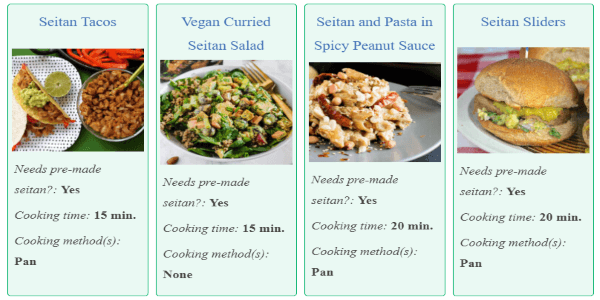
If you’re not too picky, it’s easy to toss a few of those ingredients above together and put some sort of basic sauce or peanut butter on them.
But if you have the time and desire to make really good tasting recipes, see my database of high protein vegan recipes to find some great meals to make. Or, I also have a page of over 100 vegan seitan recipes if you’d like to filter by things like cooking time and method.
Are Plant Based Proteins Complete?
As long as you’re eating a wide variety of protein sources on your plant based diet, it doesn’t matter if any particular source is a complete protein or not.
However, there are some situations where you might want to know if a protein is complete or not.
In general, very few plant proteins are complete proteins. They usually lack 1-2 essential amino acids. Additionally, while glutamine isn’t an essential amino acid (it’s “conditionally essential”), there aren’t too many good plant sources of glutamine.
Personally, I’ve only looked at whether the most popular vegan protein sources are complete. You can click the links for detailed looks, but here’s a summary:
- Is tofu a complete protein – Tofu is a minimally processed complete protein by most standards, although relatively low in methionine (common in beans).
- Is seitan a complete protein – It depends on the specific recipe, but seitan usually is not a complete protein.
- Nutritional yeast amino acid profile
If you’re interested in exploring this topic in more detail yourself, you can use my amino acid comparison tool. It let’s you compare amino acid profiles of different protein sources (both animal and plant).
Finally, I’ve also done detailed looks at the essential amino acid profiles of beans and the essential amino acid profiles of nuts.
Will Soy Affect Testosterone or Estrogen?
Soy increasing estrogen is an old myth that refuses to die.
Soy contains phytoestrogens, which are processed by our bodies very differently than the hormone estrogen.
I did a detailed summary of studies looking at if soy raises estrogen levels. The gist of that review is that unless you’re eating a ridiculous amount of soy, it won’t affect your hormones at all.
You can have a block of tofu a day with 0 worry (and probably more, but studies haven’t looked at that yet).
One study from that post that I will highlight is a meta-analysis of 15 controlled studies that concluded (5):
No significant effects of soy protein or isoflavone intake on T, SHBG, free T, or FAI were detected regardless of statistical model.
Where “T” is testosterone.
In other words, there’s no particular reason to worry about soy consumption on a typical vegetarian or vegan diet.
Soy has no statistically significant effect on testosterone or estrogen levels.
Should Vegans Use Protein Powder?
Protein powder is incredibly convenient, especially for athletes. I drink protein shakes myself on a daily basis.
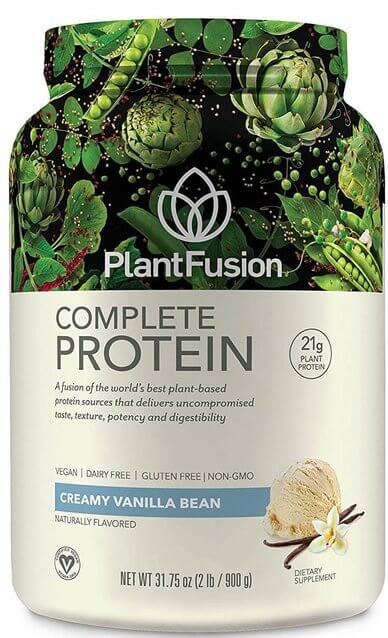
One serving of a typical protein powder has something like:
- 120 calories
- 20 grams of protein
It’s the best way to get protein as a vegan and really helpful if you’re trying to hit some tough macros.
Consider a 160 lb person who is aiming for 130 grams of protein and 2,000 calories a day. If they ate nothing but lentils (a good source), they’d get 143 grams of protein and 1800 calories. So you can make high protein goals eating just whole foods on a plant based diet, but it’s tough.
It’s much easier just to eat a few cups of legumes with other foods, some nut butter, and then add a protein shake in if needed. At the same time, if you only consumed protein shakes, it’s still possible to get too much protein.
How Does Vegan Protein Powder Compare to Whey?
There are quite a few vegan protein powders these days. Most are made from peas or a blend of protein isolated from a few different sources (e.g. peas, hemp, brown rice).
Are they as good as whey protein powder? You bet.
You can see my complete comparison of vegan vs whey protein powder if you’d like more detail, but the highlights from relevant research are:
- Pea protein was as effective as whey in a 12 week study of 161 males (6)
- Vegan protein powder are free of antinutrients and just as digestible as animal proteins (7)
- Young men using brown rice protein gained the same amount of muscle as the whey protein group in an 8 week study (8)
I did an extensive test of over 35 of them. If you’d like to see which ones I thought were best, here’s my page of the best vegan protein powders. Or, if you live in Canada, see my page of the best vegan protein powders in Canada (sorry other countries).
While it’s typically good to focus on getting nutrition from whole foods, vegan protein powder are one of the best vegan protein sources and can be a helpful tool on a plant based diet if you are struggling to get enough protein.
What About Vegan Protein Bars?
I also did a detailed test of over 20 bars to find the best vegan protein bar.
And while bars are nice, they’re more expensive than protein powder and the macros aren’t as good.
Bars have a lot of other ingredients besides protein isolate. The best bars have around 40% of calories coming from protein, versus over 85% for protein shakes.
If you have money to spare and really like bars (some do taste really good), plant based protein bars are an option. But they’re not something I think most vegans should focus on.
Alternatively, there are also many good vegan protein bar recipes that you can make to save some money.
How Do Vegan Bodybuilders and Athletes Get Enough Protein
Looking at protein in foods is one thing, but translating that to a meal plan that you can actually follow is another. Obviously, try to focus on making meals with the best vegan protein sources for athletes.
I mentioned Nimai Delgado before. He’s a vegan IFBB professional bodybuilder who I believe has been vegetarian from birth (and vegan now).
He has some videos on YouTube about his training and diet. Here’s one where he goes over what he eats in a typical day:
If you don’t have time to watch that, here’s a summary:
| Meal 1 |
|
| Meal 2 (Shake) |
|
| Meal 3 |
|
| Meal 4 |
|
He certainly loves his sweet potatoes.
That’s not a very extreme diet, but lets him get ~30-40 grams of protein per meal. If that’s enough for him, it’s probably enough for you and me.
Comparing Vegan Protein to Other Plant and Animal Protein Sources
Over time, I’ve done detailed comparisons of many different vegan protein options that you may be interested in:
- Seitan vs Tofu
- Black beans vs Kidney beans
- Black beans vs Pinto beans
- Pinto Beans vs Kidney beans
- Lentils vs Beans
- Lentils vs Chickpeas
- Brown lentils vs Red lentils
- Legumes vs Nuts
- Tempeh vs Tofu vs Seitan
- Chickpeas vs Chicken
How To Track Your Protein Intake
To end this guide I want to recommend tracking your daily protein intake using a food tracker. Whether you’re trying to avoid a protein deficiency, or an athlete building muscle, a tracker can help you find the right protein sources to create a healthy diet.
I use Cronometer, but there are others out there. It tracks not only your protein intake, but also the amino acids of those foods.
Eventually you might not need to use it as you get better at guessing how much protein is in your foods.
With that, you have everything you need to figure out how much protein you need, and the best vegan protein sources to get it on a vegan diet.
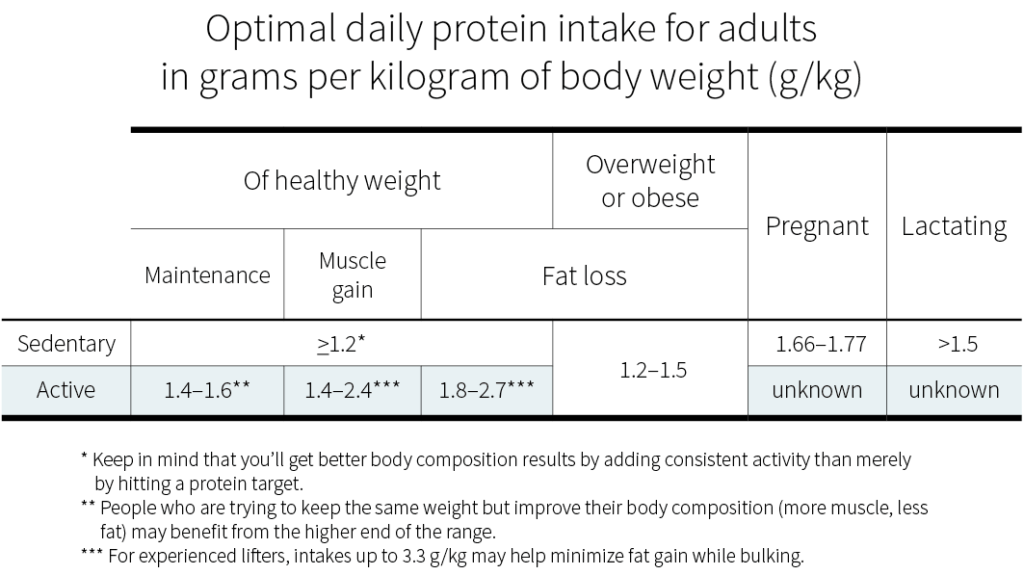

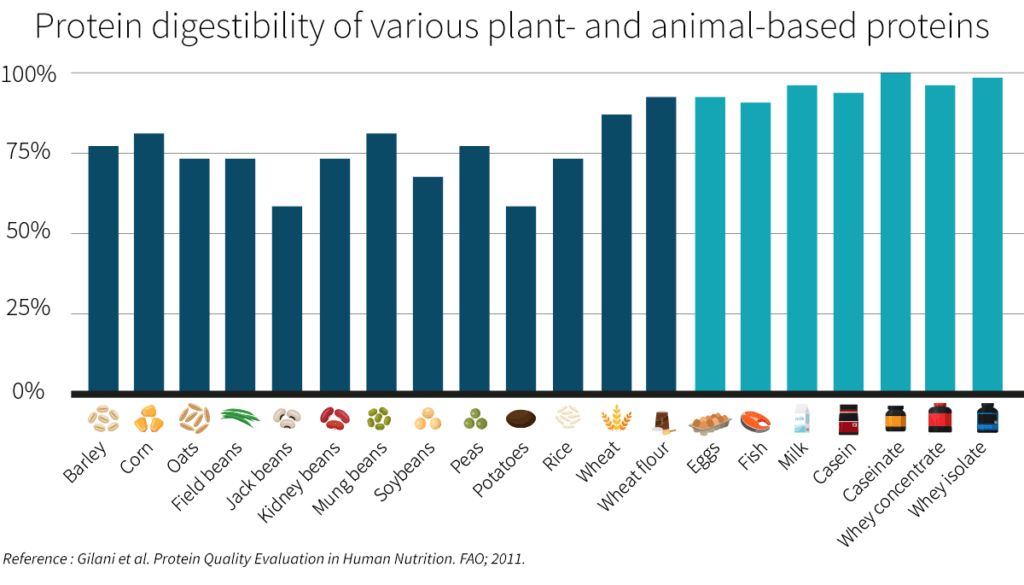
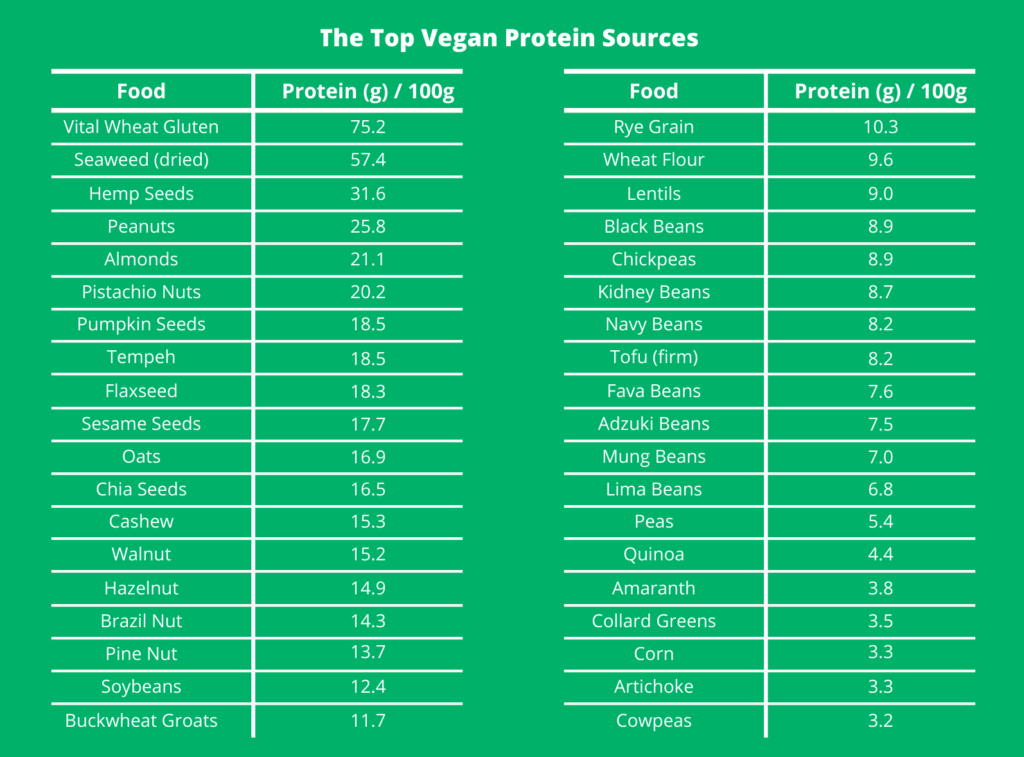

What kind of dry seaweed?
Pretty much any kind, you usually find them in small packs in grocery stores. They’re quite a bit cheaper at asian grocery stores. Something like this.
Even though they have a good percentage of protein, it’s hard to eat a lot, so it’s more of a good snack than something to really focus on.
You should add lupin beans to the list. they come second after gluten. they are 45% protein,34% carb,21% fat according to nutritiondata.org. and there are 23g of protein in 1 cup.